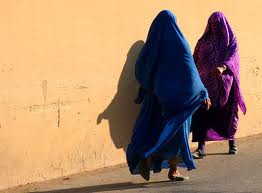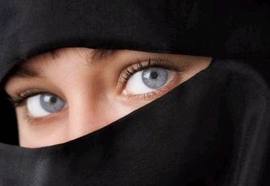How can a sister know if her hijab is correct? The scholars agreed on the following eight conditions regarding hijab:
1. Covering all of the body
It is an agreed position by many respected scholars that the face and hands of the woman must [in addition to everything else] be covered. Some scholars say it is permissible to uncover the face and the hands of the woman as long as there is no fitnah (infatuation) caused by this action. Two things must be taken into consideration:
a) if she is beautiful and beautifies her face and hands with external substances, or
b) if the society around her is corrupt where men do not lower their gaze
Then it is prohibited for her [in both these scenarios] to uncover her face and hands.
On the authority of the wife of the Prophet salla Allahu alayhi wasallam, Umm Salama radiya Allahu anha said:
“When the verse {That they should cast their outer garments over their persons} [33:59] was revealed, the women of the Ansar came out as if they had crows over their heads.” [Sahih Abi Dawud]
2.The hijab must not be a display
The hijab itself must not be a display. Allah ordained it so as to cover the beauty of women and not for showing off. Allah subhanahu wa ta’ala says,
“And not show of their adornment except only that which is apparent.” [24:31]
He also says,
“And stay in your houses and do not display yourselves like that of the times of ignorance.” [33:33]
It is in no way logical that the hijab itself be a source of display.
3. The hijab must not be transparent
The purpose of wearing hijab must be achieved. In order for the hijab to be a cover, it must not be made of transparent material making the woman covered only by name, while in reality she is naked. The Prophet salla Allahu alayhi wasallam is quoted as saying,
“During the last days of my ummah there will be women who are clothed but naked, with something on their heads like the humps of camels. Curse them, for they are cursed.” Another hadeeth adds: “They will not enter Paradise or even smell its fragrance, although its fragrance can be detected from such and such a distance.” [Narrated by Muslim]
This indicates that a woman could cause herself a grave and destructive sin if she puts on a garment that is thin and transparent and which clearly shapes her body’s features.
4. Hijab must be loose, and not tight
The hijab is a safeguard against fitnah. If it is tight, it will be descriptive of the woman’s body and this violates and defeats the whole purpose of hijab.
5.The hijab must not be perfumed
On the authority of Ad’Diya Al-Maqdisi, the Prophet salla Allahu alayhi wasallam said:
“Any woman who perfumes herself and passes by some people that they smell her scent, then she is a zaniyah (adulteress).” [Sahih an-Nasaa'i]
6. The hijab shouldn’t resemble the dress of a man
Imam Ahmed and an-Nasaa’i reported the Prophet salla Allahu alayhi wasallam to have said:
“Women who assume the manners of men are not from us and also those of men who assume the manners of women.” [Sahih al-Jami']
Further, Abu Huraira narrated that:
“The Prophet salla Allahu alayhi wasallam cursed the man who wears the dress of a woman and the woman who wears the dress of a man.” [Sahih Abi Dawood]
7. The hijab must not resemble the garments of the kuffar
Abu Dawoud and Ahmed have related that the Prophet salla Allahu alayhi wasallam said:
“The one who take the similitude (manner) of a certain people, then he/she becomes one of them.” [Sahih Abi Dawood]
Abdullah bin Umar radiya Allahu anhu said:
“The Prophet salla Allahu alayhi wasallam saw me wearing two garments dyed in saffron (orange), whereupon he said: ‘These are the clothes (usually worn) by the kuffar, so do not wear them.’” [Sahih Muslim]
8.The hijab should not be for fame
Abu Dawoud and Ibn Majah have related the prophet to saying:
“The one who wears a garment designed for a worldly fame, Allah will make them wear a garment of humility on the Day Of Resurrection then he will be set ablaze.” [Musnad Ahmad, and it is Sahih]
The garment of fame is any garment a person wears to make themselves look famous. This applies whether the garment is highly precious and shows admiration to the life of this world or if it is chosen of a low quality to show lack of interest to this worldly life. The person may put on clothes with distinct colours so as to draw attention, act proudly and/or arrogantly.
Concealed ways of display: Examining the various conditions about the hijab one can clearly recognize that many of the young Muslim women are not fulfilling these conditions. Many just take “half-way” measures, which not only mocks the community in which she lives, but also mocks the commands of Allah sunbhanahu wa ta’ala. They consider what they put on now wrongly as “hijab.” So, O Muslims, be mindful to Allah subhanahu wa ta’ala and His Messenger salla Allahu alayhi wasallam, and do not deceived by those who “bless” this action of yours and conceal their true intentions.
If you are sincere in achieving Jannah, then be mindful of these things, insha’Allah.






No comments:
Post a Comment